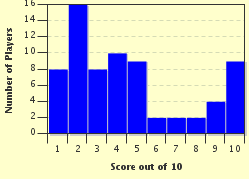Quiz Answer Key and Fun Facts
1. Which rebellion was NOT raging in China at the same time the Civil War was taking place in America?
2. In 1861 President Lincoln appointed Anson Burlingame as U.S. Minister to China. He was the first American diplomat to reside in Beijing. As a Republican congressman from Massachusetts, Burlingame had become something of a celebrity in the North shortly before the Civil War. What was his claim to fame?
3. Which of these Chinese men, a Yale graduate and naturalized U.S. citizen, volunteered to carry dispatches for the Union Army in 1864?
4. During the summer of 1863, Hong Neok Woo served as an emergency volunteer in the militia of which state?
5. In January 1865, the U.S. steam gunboat Dai-Ching ran aground on the Combahee River in South Carolina and was burned by her own crew to prevent her falling into Confederate hands. How did this Union warship get such an outlandish name?
6. Hong Xiuchuan, the leader of the Taiping Rebellion, was inspired by Christian teachings, though some of his interpretations were viewed as unorthodox by Westerners (for example, he claimed to be the younger brother of Jesus). Hong learned about Christianity from an encounter with which of these American missionaries?
7. "Blood is thicker than water!" These dramatic words were written by Commodore Josiah Tattnall, U.S. Navy, in defense of his participation in a conflict in which the United States was not supposed to be a belligerent. When and where did this happen?
8. Which of these men was a native of Salem, Massachusetts, who led a force of mercenaries called "The Ever Victorious Army" to help Qing armies against the Taiping rebels?
9. Which of the following is NOT a true statement about Henry A. Burgevine, an American soldier of fortune active in China in the early 1860s?
10. During the American Civil War, what Chinese commodity were Americans (and Britons) especially keen to import?
Source: Author
Guiguzi
This quiz was reviewed by FunTrivia editor
bloomsby before going online.
Any errors found in FunTrivia content are routinely corrected through our feedback system.

